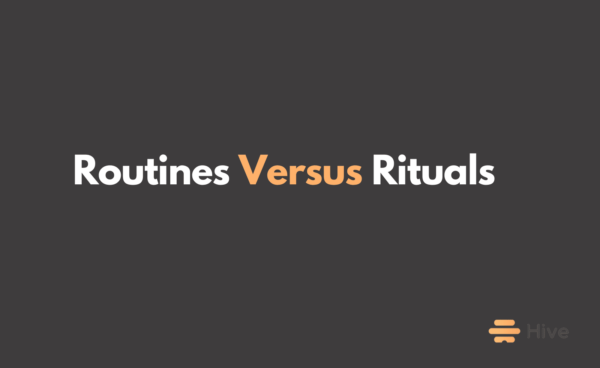In the last few years, there has been a growing interest in the rituals and routines of successful people. Books like 7 Habits Of Highly Effective People, The Alchemist, and Atomic Habits are bestsellers. And the world has begun to note the impact of small habits on our lives.
It is a common misconception that rituals and routines are the same things with different labels. They’re actually pretty different concepts.
There are many ways people organize their time: habits, routines, rituals and even schedules. While they all have similar goals — making your life easier — they all have slightly different meanings and implications.
The difference between a routine and a ritual is subtle but significant. While both are similar in that they are established patterns of behavior — usually repeated at set times — their similarities end there.
Routines are smaller segments of time you dedicate to specific tasks regularly. For example, if you go to the gym at the same time every day, that’s a routine because you do it at the same time on a regular basis.
“A champion doesn’t become a champion in the ring, he’s merely recognized in the ring. His “becoming” happens during his daily routine,” Joe Louis said.
A ritual is something larger or longer than smaller actions; for example, brushing your teeth or praying before bed would be considered rituals because of their significance and duration.
In our fast-paced world, it’s easy to feel like we don’t have enough time for everything. That’s why so many of us implement little habits — or routines — or rituals that help streamline our days and free up more brain space for bigger things.
These micro-behaviors may be“insignificant habits,” but these minute practices can significantly impact your life — so much so that some people might even consider them rituals.
A little ritual is not enough to keep your life going smoothly. You need a routine as well as a few rituals that anchor you in specific activities at specific times every day.
Routines make goals achievable
“Long-term success is a direct result of what you achieve every day. Goals provide your daily routine.” — Rick Pitino
Human beings are inherently lazy. We’d much rather spend our time on something enjoyable instead of high-value but beneficial activities that are considered boring.
When we think about the word routine, it brings images of monotony and boredom to mind. This is why we have so many shortcuts in life and ways to hack things to get the results we want with minimal effort.
But what happens when we take things too far? Even though hacks can be useful in certain situations, they can also have a negative impact on our lives if used too frequently. For example, if you only go on random days or when you feel like it, you will never see any real results.
The same goes for eating unhealthy food because it’s faster than preparing a healthy meal or taking pills instead of eating right and exercising regularly.
But what if there was another way? What if there was a way to make everything easier without taking away from its benefits? This is where routines come into play.
Routines provide structure, and structure is one of the most important things we need as humans to lead a balanced life. Routines help us achieve our goals by making them more measurable and achievable.
A good routine can help you get through each day with less stress and anxiety because you know what’s coming next in your life. Moreover, it sets up the right conditions for other habits to flourish in your life.
A consistent routine helps you sleep better, eat healthier, and stay productive throughout your day. It also allows you to build healthy habits that will last you a lifetime.
That doesn’t mean routines are easy to start or stick to. In fact, many good routines won’t become a habit until you practice them consistently for months. Some experts say 66 days is enough to make new habits stick.
“Routinize the routine. The things that aren’t important to you, whether it’s breakfast or your commute, try to do them with the least energy possible so that leaves you with more energy for other things,” says Robert Pozen.
Rituals have specific meanings
“Daily rituals, especially walks, even forced marches around the neighborhood, and schedules, whether work or meals with non-awful people, can be the knots you hold on to when you’ve run out of rope.” — Anne Lamott
A ritual is a fixed sequence of actions to create a specific atmosphere or outcome. Rituals are symbolic acts that help people to connect with important values, principles or goals.
They usually have an element of repetition involved. They can take many forms, from traditional religious practices like praying and fasting to more secular activities like going to the gym or volunteering.
While rituals vary significantly from person to person, there are some common elements that most rituals share. Rituals typically involve a series of fixed steps that must be followed in order for the ritual to be completed. They are usually carried out in a set place or location.
There’s no one right way to do rituals; it’s about finding what works best for you. Rituals provide a sense of purpose and connection to others. They can help you feel calmer and more in control of your life (which can be especially helpful when life feels chaotic).
It’s essential to have some kind of ritual in your life. Rituals are a way of showing that you care about something and that you want to do it even if you’re not really feeling like it. Rituals are also an opportunity to reflect on your values, beliefs and priorities. By connecting with these things through daily actions, they become more real.
“The key to forming good habits is to make them part of your ‘rituals.’ I have a morning ritual, an afternoon ritual, and a Sunday ritual. It’s one way to bundle good habits into regular times that you set aside to prepare yourself for the life you want,” says Lewis Howes.
Anytime you want to show that you care about something, whether it’s yourself or someone else, having a ritual is a good way to go.
Healthy routines and meaningful rituals make us more productive
Rituals and routines are important to help us feel more in control of our lives. They can help us feel calmer, more focused, and less stressed out.
When we have a set routine or pattern that we follow every day, it helps us feel more settled and stable. Rituals and routines are a great way to build a sense of consistency and predictability in your life.
The most successful and highly effective people achieve success by implementing rituals and routines into their everyday lives; we just don’t often hear about the smaller details of their lives because they aren’t remarkable. But together, they make all the difference.
When we’re able to create a set of behaviors we follow daily, it can help us feel more in control of our lives and create structure, which can be very helpful for people who tend to struggle with sticking to good behaviors.
When we have rituals and routines, it can allow us to feel more confident in ourselves and our abilities. It can help to give us an internal sense of confidence in our abilities and capabilities. This can be especially important for anyone who is feeling like they don’t know what they are supposed to do with their lives.
Rituals and routines can also help to make us feel more connected to each other and the world around us. By setting up specific times to connect with other people or by making sure that we always keep our doors open, we are helping to create a sense of community within our homes.
Having rituals and routines can also help make us feel less stressed and overwhelmed by life. By creating a set of specific routines that we follow every day, we are helping to reduce the stress in our lives so that we always have time for things that matter to us.
There are many different types of rituals and routines out there. Some are as simple as taking a shower every morning or going to bed at a certain time every night. Others can be more complex, like drinking coffee together every morning before work or eating dinner together with the family each night.
The key is that rituals and routines should be something that you personally enjoy doing — they should be something that makes you feel good about yourself. To build and maintain good habits, start small.
And make it something you can commit to for just a few days or weeks at a time. Once you get into the swing of things, you can start building on it until it becomes part of your daily life.
In today’s world, with so many distractions and constant pressure, it is all too easy to let things slide; but when we have an established routine, we can maintain control over what we are doing.
By knowing what our days are going to look like, we can plan accordingly which helps us feel more in control of our lives.
This article originally appeared in Medium.





